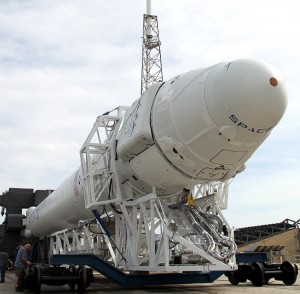
The first ever launch of a private vehicle heading for the International Space Station (ISS) is set to launch early morning of May 19. The launch has been pushed back several times, but after a successful launch rehearsal April 30 by the SpaceX launch team, the Falcon 9 rocket is finally ready for take off. The launch is planned for 4:55am EDT (08:55am UTC) and NASA will have live coverage of the event available via NASA TV. It will also be available via SpaceX Webcast.
The mission was originally intended to include only the launch of the Falcon 9 rocket, and tests of the Dragon capsule in orbit. It now also include plans for the Dragon capsule to physically connect to the Space station and deliver supplies such as food, clothing and batteries as well. The journey will also give both SpaceX and NASA the chance to test out the capsule’s sensors and control systems as it approaches the International Space Station, collecting information that can be vital for future missions.
Before the Dragon capsule can approach the Space Station, extensive tests in space are required under which the Dragon spacecraft needs to proof that it can move precisely in orbit and approach the space station carefully. Only after all tests are completed successful will the spacecraft be allowed to approach the important space laboratory. When the capsule have inched close enough, it will be grappled by a robotic arm operated from the Space station, finally docking to allow supplies to be delivered.
The Falcon 9 rocket is powered by nine Merlin engines. The rocket’s second stage is powered by a Merlin vacuum engine, which runs on refined kerosene and liquid oxygen, the same fuel and oxygen combination that was used on NASA’s Saturn V moon rockets first stage. SpaceX’s Dragon capsule is scheduled to operate in space for about three weeks, including an unprecedented rendezvous and berthing to the space station.
NASA wants the private industry to deliver cargo to the orbiting laboratory on a regular basis. If this launch is successful, it might be a landmark victory for SpaceX as a company, but possibly also move future space exploration towards privately run companies. NASA engineers and flight controllers have been working closely with SpaceX ahead of this flight to coordinate the intricate approach, rendezvous and birthing plans needed for this historic mission to the International Space Station.
